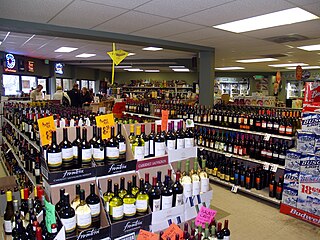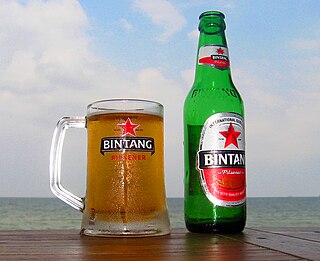Beer in China first was brewed in 7000 BC, and remained the dominant alcoholic beverage through the Han dynasty, after which it was eclipsed by the production of rice wine. Modern brewing appeared in the late 1800s, brought to China by Europeans who brewed pale lagers, such as Tsingtao. Both beer production and consumption of local and imported brands grew increasingly popular in the 20th century. In the 21st century, China became the world's largest consumer of beer, commercial scale brewing expanded, and craft beer began to spread beyond expatriate communities and make inroads amongst the Chinese population.

In the United Kingdom, a tied house is a public house required to buy at least some of its beer from a particular brewery or pub company. That is in contrast to a free house, which is able to choose the beers it stocks freely.

In the United States, beer are manufactured in breweries which range in size from industry giants to brew pubs and microbreweries. The United States produced 196 million barrels (23.0 GL) of beer in 2012, and consumes roughly 28 US gallons (110 L) of beer per capita annually. In 2011, the United States was ranked fifteenth in the world in per capita consumption, while total consumption was second only to China.
The three-tier system of alcohol distribution is the system for distributing alcoholic beverages set up in the United States after the repeal of Prohibition. The three tiers are importers or producers; distributors; and retailers. The basic structure of the system is that producers can sell their products only to wholesale distributors who then sell to retailers, and only retailers may sell to consumers. Producers include brewers, wine makers, distillers and importers. The three-tier system is intended to prohibit tied houses and prevent "disorderly marketing conditions."

A liquor store is a retail business that predominantly sells prepackaged alcoholic beverages, including liquors, wine or beer, usually intended to be consumed off the store's premises. Depending on region and local idiom, they may also be called an off-licence, off-sale, bottle shop, bottle store or, colloquially, bottle-o, liquor store or other similar terms. A very limited number of jurisdictions have an alcohol monopoly. In US states that are alcoholic beverage control (ABC) states, the term ABC store may be used.

Beer in Japan mostly comes from the country's four major breweries, Asahi, Kirin, Sapporo and Suntory, which mainly produce pale lagers around 5% ABV. Beer is immensely popular, far ahead of sake consumption.
The Washington State Liquor and Cannabis Board, formerly the Washington State Liquor Control Board, is an administrative agency of the State of Washington. The Liquor and Cannabis Board is part of the executive branch and reports to the Governor. The board's primary function is the licensing of on and off premises establishments which sell any type of alcohol, and the enforcement and education of the state's alcohol, tobacco, and cannabis laws.
This article covers various topics involving alcoholic drinks in Canada. The Government of Canada defines an alcoholic drink as "a beverage containing 1.1% or more alcohol by volume."

A liquor license is a governmentally issued permit for businesses to sell, manufacture, store, or otherwise use alcoholic beverages.
The Virginia Alcoholic Beverage Control Authority is one of the eleven public safety agencies under the Secretariat of Public Safety and Homeland Security for the Commonwealth. The agency administers the state's ABC laws. ABC stores are the only retail outlets in Virginia where customers may purchase distilled spirits. The profits that Virginia ABC contributes are collected from sales of distilled spirits at ABC stores, taxes collected on beer and wine sales, violation penalties and license fees. Since its establishment in 1934, Virginia ABC has contributed more than $9 billion to the Commonwealth's general fund. Virginia ABC employs more than 4,000 people statewide.

The alcohol laws of Kansas are among the strictest in the United States, in sharp contrast to its neighboring state of Missouri, and similar to its other neighboring state of Oklahoma. Legislation is enforced by the Kansas Division of Alcoholic Beverage Control.
Hensley Beverage Company, previously known as Hensley & Co., is a wholesaler and distributor for Anheuser-Busch beer, and later for a variety of other brands and drinks, that is headquartered in the West Phoenix area of Phoenix, Arizona. As of 2007, it was the third-largest Anheuser-Busch distributor in the United States and one of the largest privately held companies in Arizona.

The state laws governing alcoholic beverages in New Jersey are among the most complex in the United States, with many peculiarities not found in other states' laws. They provide for 29 distinct liquor licenses granted to manufacturers, wholesalers, retailers, and for the public warehousing and transport of alcoholic drinks. General authority for the statutory and regulatory control of alcoholic drinks rests with the state government, particularly the Division of Alcoholic Beverage Control overseen by the state's Attorney General.

Breweries in New Hampshire produce a wide range of beers in different styles that are marketed locally, regionally, and nationally. Brewing companies vary widely in the volume and variety of beer produced, from small nanobreweries and microbreweries to massive multinational conglomerate macrobreweries.

California Beer and Beverage Distributors (CBBD) is the largest nonprofit trade association representing brewers, distributors, and retailers of beer in the state of California.

Bell's Brewery, Inc. is an American craft brewing company, with operations in Comstock and Kalamazoo, Michigan. Bell's brews acclaimed beers such as Hopslam Ale, Oberon Ale, and Two Hearted Ale. It operates a brewpub and a store selling merchandise and homebrewing supplies at its Kalamazoo location. Begun as a homebrewing store in 1983, and producing beer since 1985, it is the oldest existing craft brewery in Michigan and the oldest craft brewery east of Colorado. As of 2021, it was the 6th largest craft brewery in the United States, and was the largest independently owned brewery in Michigan when founder Larry Bell sold the company to the subsidiary of the Japanese Kirin beverage group, Lion - an Australian producer of alcoholic beverages, at the end of 2021. The company also owns Upper Hand Brewery, a separately operated division in Escanaba, Michigan.
The production of beer in New Jersey has been in a state of recovery since Prohibition (1919-1933) and the Great Depression (1929-1945). Currently, the state has 123 licensed breweries: a large production brewery owned by an international beverage company, Anheuser-Busch InBev, and 122 independent microbreweries and 19 brewpubs. The growth of the microbreweries and brewpubs since the 1990s has been aided by the loosening of the state's licensing restrictions and strict alcohol control laws, many of which were a legacy of Prohibition.

Alcohol in Indonesia refers to the alcohol industry, alcohol consumption and laws related to alcohol in the South East Asian country of Indonesia. Indonesia is a Muslim majority country, yet it is also a pluralist, democratic and secular nation. These social and demographic conditions led to Islamic parties and pressure groups pushing the government to restrict alcohol consumption and trade, while the government carefully considers the rights of non-Muslims and consenting adults to consume alcohol, and estimates the possible alcohol ban effects on Indonesian tourism and the economy.

Beer in Egypt has long held a significant role, and its presence in the country is thought to date back to the Predynastic period. In ancient Egypt wine was preferred by the upper class, whereas beer was a staple for working class Egyptians and a central part of their diet. Despite religious restrictions and conflicting views on alcohol after the Muslim conquest of Egypt, the consumption of beer did not cease, and it still remains the most popular alcoholic beverage in the country by far, accounting for 54 percent of all alcohol consumption.
Beer distribution worldwide has several different steps, ranging from the production of supplies used in the making of beer to selling it in stores, with many separate interactions in between. In general, beer distribution can be shown by a three tiered or two tiered model of distribution, with most of the world partaking in the latter.












